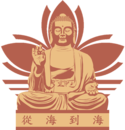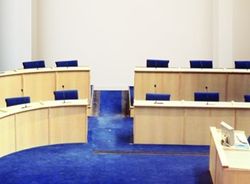Hokoan House of Representatives
This article contains too many red links, and may be going through a major copy edit. You can help by clicking on red links and creating articles or by removing unnecessary red links. |
Hokoan House of Representatives 佛國眾議院 | |
|---|---|
| 2nd Parliament of Hokoan | |
 | |
| Type | |
| Type | of the Parliament of Hokoan |
| Leadership | |
| Structure | |
| Seats | 27 |
Political groups | • National (13)
• Labour (9) • Liberal (4) |
| Elections | |
Last election | N/A |
Next election | 15 May 2019 |
| Meeting place | |
 | |
| Parliament House, Longmen | |
The Hokoan House of Representatives is a component of the Parliament of Hokoan, along with the President. The House passes all laws, provides ministers to form a Cabinet, and supervises the work of the Government. It is also responsible for adopting the state's budgets and approving the state's accounts.
The House of Representatives is a democratically elected body whose members are known as Members of Parliament (MPs). There are usually 27 members, though this number can be higher if there is an overhang. MPs are elected usually every five years in multi-seat constituencies in a mixed system of district voting and party list voting. A government is formed from the party or coalition with the majority of MPs. If no majority is possible then a minority government can be formed with a confidence and supply arrangement. If a government is unable to maintain the confidence of the House then an early general election can be called.
Constitutional function
The House of Representatives takes the House of Commons of the United Kingdom as its model. The Hokoanese Parliament is based on the Westminster system (that is, the model of the Parliament of the United Kingdom). As a democratic institution, the primary role of the House of Representatives is to provide representation for the people and to pass legislation on behalf of the people.
The House of Representatives plays an important role in responsible government. The Government of Hokoan (the executive branch, headed by the Cabinet) draws its membership exclusively from the House of Representatives. A government is formed when a single party or group of parties can show that they have the "confidence" (support) of the House. This can involve making agreements among several parties. Some may join a coalition government, while others may stay outside the Government but agree to support it on confidence votes. The Prime Minister is answerable to, and must maintain the support of, the House of Representatives. Thus, whenever the office of prime minister falls vacant, the President appoints the person most likely to command the support of the House—that is, the leader of the Government.
Members and elections
The House of Representatives normally consists of 27 members, known as Members of Parliament (MPs).
Members of Parliament are directly elected to five-year terms in multi-seat constituencies, subject to calls for early elections. These elected members represent the voters of Hokoan in the House of Representatives. Members represent the people to the House and the Government; they, in turn, represent the actions of the House and the Government to the people.
Officials and officers
The Speaker of the House presides over sittings. It is the Speaker's role to apply the rules of the House (Standing Orders), and oversee procedures and the day-to-day operation of the House. The House appoints a Deputy Speaker from amongst its members. The Deputy Speaker may perform the Speaker’s role when the Speaker is absent. Up to two Assistant Speakers are also appointed from amongst the members of the House.
Several partisan roles are filled by elected members. The Prime Minister is the head of government. The Leader of the Opposition is the member of Parliament who leads the largest opposition party (which is usually second-largest caucus in the House). The Leader of the House is a member appointed by the Prime Minister to arrange government business and the legislative programme of Parliament. Whips are organisers and administrators of the members in each of the political parties in the House. The whips make sure that members of their party are in the House during crucial votes.
A Clerk is responsible for several key administrative tasks, such as "advising members on the rules, practices and customs of the House". The Clerk is a non-political appointee.
The Serjeant-at-Arms is the officer who has the duty of maintaining order in the precincts of the House. The Serjeant-at-Arms sits in the debating chamber opposite the Speaker at the visitors door for each House sitting session. The Serjeant-at-Arms is also the custodian of the mace, and bears the mace into and out of the chamber of the House at the beginning and end of each sitting day.
Passage of legislation
Most parliamentary business is about making new laws and amending old laws. The House examines and amends bills (proposed laws) in several formal stages. Once a bill has passed through all its parliamentary stages it becomes an Act of Parliament, forming part of Hokoan's law.
Bills become Acts after being approved three times by House votes and then receiving the sanction from the President. The majority of bills are promulgated by the Government of the day (that is, the party or parties that have a majority in the House). It is also possible for individual MPs to promote their own bills, called member's bills—these are usually put forward by opposition parties, or by MPs who wish to deal with a matter that parties do not take positions on.
Proxy voting is allowed, in which members may designate a party or another member to vote on their behalf. An excuse is required.
See also
 Republic of Hokoan |
History
Prehistory | Independence | Republic of Hokoan Geography Climate | biodiversity | Ming River | Urban areas | Nature reserves Government Administrative divisions | Constitution | Elections | Foreign relations | Government (Cabinet of Hokoan • Prime Minister) | Human rights | Parliament (House of Representatives) | Law | Military | Police | Political parties | President Economy Central bank | Economy Statistics | Yuan (currency) | Trade policy Society Crime | Education | Demographics | Religion | Smoking | Symbols | Culture |
|---|